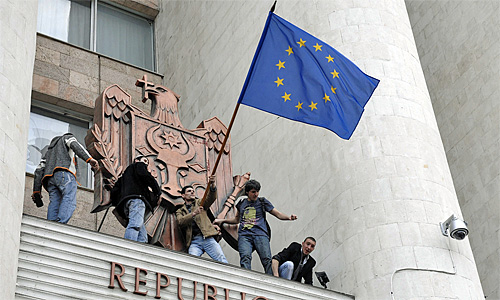
Ukraine – Orange Revolution
Myanmar – Saffron Revolution
Georgia – Rose Revolution
Lebanon – Cedar Revolution (OK – Cedar isn’t really a color, but it’s quite descriptive)
Moldova?
All these nations had popular revolts between 2004 and 2007. The Bush Administration moved quick to give them cute and happy names to express support for them. In Ukraine, the Orange Revolution was a success by pro-Western voters over Russophile politicians. Georgia’s Rose Revolution was also an anti-Russian movement allowing for greater US influence in Tblisi. The Cedar Revolution resulted in the removal of Syrian forces from Lebanon. And the Saffron Revolution, although failed, was a show of popular resistance against the fiercely anti-American military junta. Wikipedia’s got a whole list of these “Color Revolutions” here. It emphasizes that most of these revolutions were anti-Communist and usually in places with Russian influence.
So, today’s revolt in Moldova against the Communist leadership of President Vladimir Voronin should be seen as a boon to the West. Moldova is one of the poorest countries in Europe and has a significant pro-Kremlin population (mostly in Transnistria). Reuters has a good analysis of some of the international political ramifications of the revolt.
What color will the Moldova revolt take, if any?
If Bush were still in power in Washington, the popular revolt probably would have received a color by now.
I like calling it the “Wine Revolution”, named after Moldova’s famous viticulture.
Despite the shift in Washington from Bush to Obama however, the Wine Revolution will likely never see fruition. The tiny nation does not necessarily bear any strategic importance for the US. In addition, the Obama Administration’s new “reset button” with Russia will likely tone down any large statement about these developments.
No wine for Washington.
Photo Credit: Vadim Denisov / AFP/Getty Images